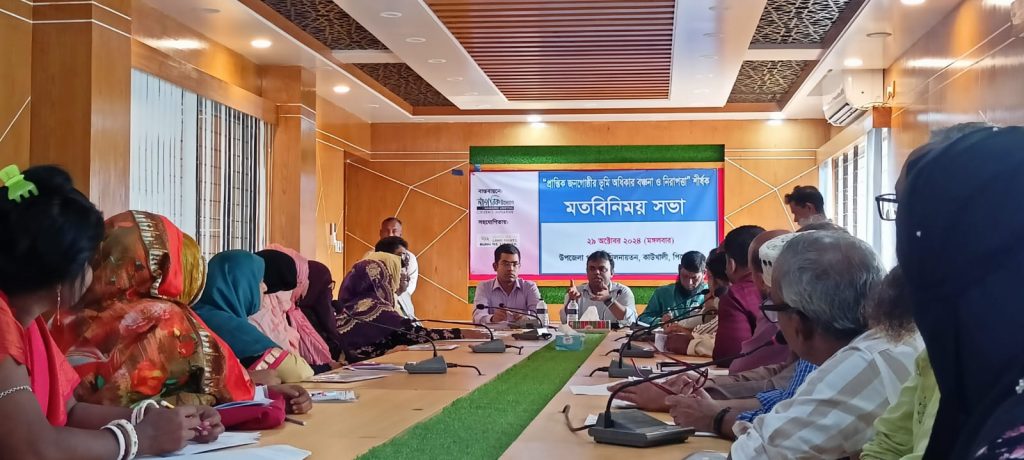Documenting Ground Realities of Land Tenure Systems in Bangladesh
The struggle for land rights in Kawkhali reflects broader national challenges facing land tenure systems in marginalized regions of Bangladesh. Despite policy ambitions and reform rhetoric, landless communities in Kawkhali Upazila continue to face exclusion, uncertainty, and systemic inequity. Field observations and community dialogues reveal that while there have been policy commitments, practical implementation remains riddled with challenges—particularly in the areas of land allocation and Balumhal sand lease governance.
The Gap Between Policy and Practice
The “Zero Landless” initiative was introduced as a landmark effort to reduce poverty and promote inclusive development. However, during a recent visit to Kawkhali, the Assistant Commissioner (AC) of Land openly acknowledged that the program’s reported success was more political than practical. Despite public declarations of progress, many families still lack access to land—undermining the credibility of the initiative and reinforcing the structural inequalities that land rights in Kawkhali were meant to address.
This disconnect is not limited to land tenure. The same marginalization exists in the alloc

ation of Balumhal sand leases, where local elites often dominate the process, sidelining the needs and voices of landless communities. If unaddressed, these gaps will continue to prevent meaningful reforms from taking hold.
Identification Challenges in Land Reform
A core challenge in realizing equitable land rights in Kawkhali is the identification of the truly landless. Outdated records, informal settlements, and political manipulation hinder accurate landless registries. While local governments and NGOs have provided support, many marginalized individuals remain unrecognized by formal systems—denied both access to land and the services that land ownership enables.
Reform efforts must strengthen identification mechanisms by involving community members in transparent, verifiable surveys. This would ensure the inclusion of both formal and informal settlers and build a stronger foundation for equitable land distribution.
Balumhal Sand Leases: Resource Governance and Inequality
The issue of land rights in Kawkhali is closely tied to local resource governance—especially the management of Balumhal sand leases. These leases have historically been controlled by politically connected actors, with little oversight or transparency. While policy reforms have attempted to democratize lease access, entrenched patronage networks and weak institutional accountability continue to thwart equitable distribution.
For landless populations, fair access to Balumhal leases could offer both economic opportunity and a pathway out of poverty. When governed equitably, these resources have the potential to fund public infrastructure, support small businesses, and generate employment. Reimagining Balumhal as a transparent and inclusive system is essential to addressing land inequality at the grassroots level.
Obstacles to Implementing Land Reform
Despite strong policy frameworks, the reality for landless communities remains bleak:
-
Economic vulnerability: Without land, families cannot access credit or stable income.
-
Insecure housing: Informal settlements leave people vulnerable to eviction and natural disasters.
-
Limited livelihood options: Most landless people rely on precarious, low-wage work.
-
Barriers to education and healthcare: Income limitations restrict access to basic services.
-
Legal exclusion: Many landless individuals lack the documents required to claim land.
-
Corruption: Political favoritism often diverts land and Balumhal leases away from the intended beneficiaries.
Unless these issues are addressed, land reform in Bangladesh—including land rights in Kawkhali—will fail to deliver meaningful change.
Pathways to Inclusive Land Governance
For genuine transformation, land rights in Kawkhali must be grounded in transparency, equity, and community-led governance:
-
Transparent Identification: Community-led surveys can validate who is landless and ensure fair allocation.
-
Institutional Reform: Stronger legal systems and anti-corruption measures are critical to uphold rights.
-
Integrated Development: Land access must be supported with education, healthcare, and employment services.
-
Local Participation: Community involvement in policymaking fosters trust and accountability.
Reforms must also extend to Balumhal sand leases, where transparent processes and inclusive policies are crucial for equitable development.
Moving Forward: Land Justice for All
The situation in Kawkhali serves as a powerful case study for land governance across Bangladesh. Bridging the gap between land policy and practice requires data-driven reform, honest political will, and inclusive planning. By placing marginalized voices at the center of policy implementation, the nation can finally advance toward land justice.
Only with a firm commitment to equity and participation can land rights in Kawkhali become a model for inclusive and sustainable development across Bangladesh.
